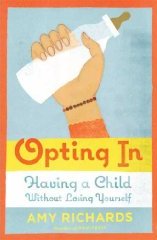Amy Richards’ Opting In: Having a Child Without Losing Yourself is a response to the 2004 New York Times Magazine‘s cover story, The Opt-Out Revolution, which discusses the trend of educated American women leaving their careers in favour of motherhood. Opting In explores the relationship between feminism and motherhood and the gamut of related social issues from career choices to female friendships, to child care issues and mother to grandmother relationships, covering feminism’s accomplishments since the 1950s.
The book is a good starting point for women – to be very specific, well-off American women – who feel a little conflicted about their career after having a baby, or unsure of their ability to mother. The book captures quite well the preoccupations of this certain female subset that are just as devoted to their careers as to their children, and have the economic and social power to make choices about their lifestyle. Female insecurity and the complications of traditional role playing come to the forefront in discussions throughout the book, and the author finds these to be driving forces in her own life (which can sometimes make the book seem like overindulgent introspection rather than observation about most women).
Recognizing these issues is a great step, but the book could have gone further. I loved Richards’ initial emphasis on "being the change you want to see in the world," but this sentiment is unfortunately rarely continued in discussion of the topics covered in the book. Why not alleviate the insecurity and help women past the stereotypes of ‘sweet housewife and mother,’ ‘career mom,’ or ‘wild loner woman’ rather than reasserting, validating and bemoaning them. The author states, after all, that you can measure feminism’s progress by the number of choices provided to women. One could say then that a woman who discards those stereotypical options completely, and sees the multitude of choices and paths before her, is the ultimate feminist.
I would have liked the author to provide less anecdotal and more factual information about how women have gone beyond the stereotypes of super-mother and career-woman. Instead, Richards seemed to resent and obsess over society’s lack of recognition of those women who struggle to break past these roles, all the while maintaining her own insecurity about those choices.
For instance, she discusses the option of ‘taking time off work to mother,’ which is a common phrase, but one I would expect someone like Richards to be more wary of. I see that as insecurity and old stereotypical thinking bubbling up into our language. When not working in my business, I don’t see myself as "taking time off," and not specifically to mother either. I am leaving focus on one project, and putting more energy on the new focus of building family up – not just my baby, but my husband, friends, extended family and community. I completely agree with Richards that our choices are more fluid than the media and stereotypes would have us believe, but I find it hard to relate to how she communicates her ideas. Although I deeply appreciate her honesty, it leaves her example of feminism feeling a little behind the times.
For those new to the subject, Opting In provides a well footnoted historical review and reference of influential people, writings, laws and sound bytes of feminism over the last 50 years in America. I only wish the other references and claims she makes outside of the feminist movement were footnoted as thoroughly. There are quite a few assumptions made when it comes to general culture and history – for instance, the British health system is sub-standard according to whom?
Richards paints many of the resulting problems women are facing only in the feminist context, rather than also framing them in the context of a modern economy, government and value system. She writes of the majority of American women having to work outside the home just to financially sustain the family, having to balance child care with that work and pay exorbitant amounts for heath insurance. These are issues that concern all Americans, and to call them feminist issues risks distancing the other concerned and affected half of the population. The rise in the cost of living that has overwhelmed most families has perhaps limited women’s choice more than any anti-feminist sentiment.
Richards often relates so many topics together that often her conclusions are lost, but the conversation is captivating. Her writing style is very accessible making for pleasant read, and there is something to be said for getting people to think in new ways.–Kirsten Marshall
Kirsten Marshall is the founder and owner of a software company, full time mother and enjoying her current role as the Director of Criticism. She lives in Vancouver with her husband and their one year old baby girl.




